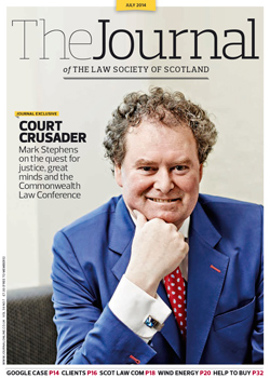Opinion: Graeme McCormick

With the merger of Dundas & Wilson into the CMS family, there goes another prince of Scotland’s legal kingdom. I offer the former partners and staff best wishes for the future.
Almost 40 years ago, as a law student at Edinburgh University, I came across Dundas & Wilson where some of their partners were professors, lecturers and tutors. The name was held in such high esteem that if your colleagues secured an apprenticeship there, you knew they would be something special. Even now, a call or letter from Dundas & Wilson would send a frisson of apprehensive deference up my spine.
But things change, and D&W’s demise really hurts. Why should it? I never entered their portals or even dabbled in the variety of commercial work which was their trade mark. I look on them from afar and am ignorant of the dynamic of working in such a business. So what I am about to say can be reasonably denounced as founded on the refuge of ignorance, prejudice and downright Luddism.
Some of the erstwhile partners of Scottish legal firms who have taken the London shilling trot out the rather tired excuse we hear from the apologist for every recent takeover victim. The merged outfit has a depth of talent and range of expertise that is better able to provide the services its clients demand and expect in this globalised world. This is usually combined with a statement that the credit crunch forced firms to reassess their business plans and strategies.
Dealing with the credit crunch fallout first, I suspect that few legal firms were not affected by the bank crisis. Many of us had to endure the ultimate personal and moral turpitude of sacking staff. Yet some of us dug deep and threw everything at it to keep going. As things have improved, we even managed to offer some of our former staff a job again. Many Scottish firms have survived and flourished and their inventiveness leaves me with a mixture of jealousy and admiration. Did those in charge of some of our former “A” list legal firms not have the confidence to invest in their firms to keep them going?
The “depth of talent” justification sounds very hollow. How is it our not-so-small country has some of the finest university legal faculties offering education and expertise in all areas of domestic and international law? Why is it that we seek their advice when we have a problem beyond our expertise? Why do other nationals come to study law here? Why is there a confidence in promoting our legal heritage for international dispute resolution? And why do our judges have the expertise to determine legal complexities with the best of their international peers, yet major Scottish legal firms are unable to stay independent with a complement of lawyers exceeding the number in a university faculty?
Our Law Society has quite rightly taken a neutral stance in the referendum debate, but it is surely significant that it has said on record that our profession is equipped to offer the range of legal expertise to all who would trade, engage and challenge in our new democracy. The opportunities and challenges for our profession would be immense and exciting. There is a grass roots revolution, which includes significant business interests, happening in our communities: thousands of people from all walks of life are discussing and demanding significant change which no political party or leader, however respected he or she might be, will be able to resist. There is a thirst for finance and insurance to be the servant of our people and not our abuser. Legal firms immersed in our society will stand to gain tremendously, while solicitors who straddle two financial visions will wobble.
I have no direct knowledge of the legal professions in other states of a similar size to Scotland, but I would guess that while some of their members may have arrangements with international stables, the beneficial owners remain within their own jurisdictions. I don’t look on that state of affairs as narrow, but a celebration and manifestation of these states’ raison d’être, and a real contribution to and respect for the rule of law.
In this most historic year of our nation’s story, the disappearance of firms like Dundas & Wilson is such a bitter irony.
In this issue
- “The Union and the law” revisited
- Cartels: raising the stakes
- The cooling-off catch
- Attack vectors into the law: smartphones
- Money laundering: the Fourth way
- Has Glasgow morality come to Edinburgh?
- Reading for pleasure
- Opinion: Graeme McCormick
- Book reviews
- Profile
- President's column
- 10-year target
- Headline act
- Forget that you ever knew me
- The cooling-off catch (1)
- Tax devolution: the legal implications
- Ninth life
- Planning: how does the wind blow?
- Going off the rails
- Employee shares? Sort them yourself
- Angostura, anyone?
- National priorities
- Scottish Solicitors' Discipline Tribunal
- People on the move
- Heart of the action
- Helping solicitors on Help to Buy
- Conditions countdown
- Where bullocks fear to roam
- Fit to grant?
- Controlling the risks
- Ask Ash
- Opening up the law
- From the Brussels office
- Law reform roundup
- Post-corroboration Review update






